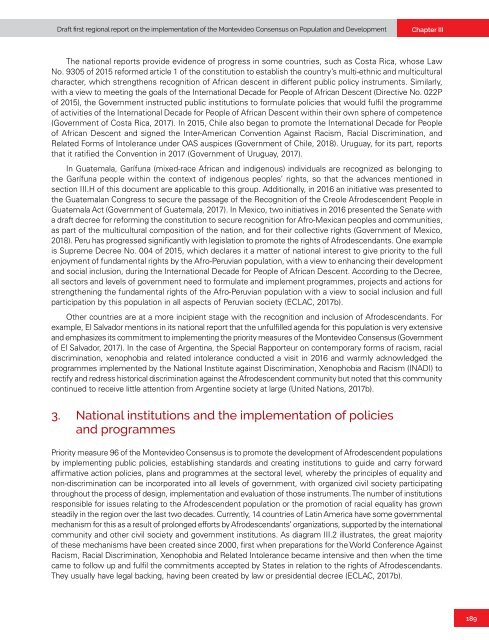Draft first regional report on the implementation of the Montevideo Consensus on Population and Development
This draft report seeks to give an account of progress in the implementation of the priority measures of the Montevideo Consensus on Population and Development in the region, as well as the differences between countries in terms of the degree of implementation. By highlighting relevant national experiences, it also seeks to facilitate the exchange of good practices among countries so that they can benefit from each other in their efforts to advance the implementation of the actions of the Montevideo Consensus.
This draft report seeks to give an account of progress in the implementation of the priority measures of the Montevideo Consensus on Population and Development in the region, as well as the differences between countries in terms of the degree of implementation. By highlighting relevant national experiences, it also seeks to facilitate the exchange of good practices among countries so that they can benefit from each other in their efforts to advance the implementation of the actions of the Montevideo Consensus.
Create successful ePaper yourself
Turn your PDF publications into a flip-book with our unique Google optimized e-Paper software.
<str<strong>on</strong>g>Draft</str<strong>on</strong>g> <str<strong>on</strong>g>first</str<strong>on</strong>g> <str<strong>on</strong>g>regi<strong>on</strong>al</str<strong>on</strong>g> <str<strong>on</strong>g>report</str<strong>on</strong>g> <strong>on</strong> <strong>the</strong> implementati<strong>on</strong> <strong>of</strong> <strong>the</strong> M<strong>on</strong>tevideo C<strong>on</strong>sensus <strong>on</strong> Populati<strong>on</strong> <strong>and</strong> <strong>Development</strong><br />
Chapter III<br />
The nati<strong>on</strong>al <str<strong>on</strong>g>report</str<strong>on</strong>g>s provide evidence <strong>of</strong> progress in some countries, such as Costa Rica, whose Law<br />
No. 9305 <strong>of</strong> 2015 reformed article 1 <strong>of</strong> <strong>the</strong> c<strong>on</strong>stituti<strong>on</strong> to establish <strong>the</strong> country’s multi-ethnic <strong>and</strong> multicultural<br />
character, which streng<strong>the</strong>ns recogniti<strong>on</strong> <strong>of</strong> African descent in different public policy instruments. Similarly,<br />
with a view to meeting <strong>the</strong> goals <strong>of</strong> <strong>the</strong> Internati<strong>on</strong>al Decade for People <strong>of</strong> African Descent (Directive No. 022P<br />
<strong>of</strong> 2015), <strong>the</strong> Government instructed public instituti<strong>on</strong>s to formulate policies that would fulfil <strong>the</strong> programme<br />
<strong>of</strong> activities <strong>of</strong> <strong>the</strong> Internati<strong>on</strong>al Decade for People <strong>of</strong> African Descent within <strong>the</strong>ir own sphere <strong>of</strong> competence<br />
(Government <strong>of</strong> Costa Rica, 2017). In 2015, Chile also began to promote <strong>the</strong> Internati<strong>on</strong>al Decade for People<br />
<strong>of</strong> African Descent <strong>and</strong> signed <strong>the</strong> Inter-American C<strong>on</strong>venti<strong>on</strong> Against Racism, Racial Discriminati<strong>on</strong>, <strong>and</strong><br />
Related Forms <strong>of</strong> Intolerance under OAS auspices (Government <strong>of</strong> Chile, 2018). Uruguay, for its part, <str<strong>on</strong>g>report</str<strong>on</strong>g>s<br />
that it ratified <strong>the</strong> C<strong>on</strong>venti<strong>on</strong> in 2017 (Government <strong>of</strong> Uruguay, 2017).<br />
In Guatemala, Garífuna (mixed-race African <strong>and</strong> indigenous) individuals are recognized as bel<strong>on</strong>ging to<br />
<strong>the</strong> Garífuna people within <strong>the</strong> c<strong>on</strong>text <strong>of</strong> indigenous peoples’ rights, so that <strong>the</strong> advances menti<strong>on</strong>ed in<br />
secti<strong>on</strong> III.H <strong>of</strong> this document are applicable to this group. Additi<strong>on</strong>ally, in 2016 an initiative was presented to<br />
<strong>the</strong> Guatemalan C<strong>on</strong>gress to secure <strong>the</strong> passage <strong>of</strong> <strong>the</strong> Recogniti<strong>on</strong> <strong>of</strong> <strong>the</strong> Creole Afrodescendent People in<br />
Guatemala Act (Government <strong>of</strong> Guatemala, 2017). In Mexico, two initiatives in 2016 presented <strong>the</strong> Senate with<br />
a draft decree for reforming <strong>the</strong> c<strong>on</strong>stituti<strong>on</strong> to secure recogniti<strong>on</strong> for Afro-Mexican peoples <strong>and</strong> communities,<br />
as part <strong>of</strong> <strong>the</strong> multicultural compositi<strong>on</strong> <strong>of</strong> <strong>the</strong> nati<strong>on</strong>, <strong>and</strong> for <strong>the</strong>ir collective rights (Government <strong>of</strong> Mexico,<br />
2018). Peru has progressed significantly with legislati<strong>on</strong> to promote <strong>the</strong> rights <strong>of</strong> Afrodescendants. One example<br />
is Supreme Decree No. 004 <strong>of</strong> 2015, which declares it a matter <strong>of</strong> nati<strong>on</strong>al interest to give priority to <strong>the</strong> full<br />
enjoyment <strong>of</strong> fundamental rights by <strong>the</strong> Afro-Peruvian populati<strong>on</strong>, with a view to enhancing <strong>the</strong>ir development<br />
<strong>and</strong> social inclusi<strong>on</strong>, during <strong>the</strong> Internati<strong>on</strong>al Decade for People <strong>of</strong> African Descent. According to <strong>the</strong> Decree,<br />
all sectors <strong>and</strong> levels <strong>of</strong> government need to formulate <strong>and</strong> implement programmes, projects <strong>and</strong> acti<strong>on</strong>s for<br />
streng<strong>the</strong>ning <strong>the</strong> fundamental rights <strong>of</strong> <strong>the</strong> Afro-Peruvian populati<strong>on</strong> with a view to social inclusi<strong>on</strong> <strong>and</strong> full<br />
participati<strong>on</strong> by this populati<strong>on</strong> in all aspects <strong>of</strong> Peruvian society (ECLAC, 2017b).<br />
O<strong>the</strong>r countries are at a more incipient stage with <strong>the</strong> recogniti<strong>on</strong> <strong>and</strong> inclusi<strong>on</strong> <strong>of</strong> Afrodescendants. For<br />
example, El Salvador menti<strong>on</strong>s in its nati<strong>on</strong>al <str<strong>on</strong>g>report</str<strong>on</strong>g> that <strong>the</strong> unfulfilled agenda for this populati<strong>on</strong> is very extensive<br />
<strong>and</strong> emphasizes its commitment to implementing <strong>the</strong> priority measures <strong>of</strong> <strong>the</strong> M<strong>on</strong>tevideo C<strong>on</strong>sensus (Government<br />
<strong>of</strong> El Salvador, 2017). In <strong>the</strong> case <strong>of</strong> Argentina, <strong>the</strong> Special Rapporteur <strong>on</strong> c<strong>on</strong>temporary forms <strong>of</strong> racism, racial<br />
discriminati<strong>on</strong>, xenophobia <strong>and</strong> related intolerance c<strong>on</strong>ducted a visit in 2016 <strong>and</strong> warmly acknowledged <strong>the</strong><br />
programmes implemented by <strong>the</strong> Nati<strong>on</strong>al Institute against Discriminati<strong>on</strong>, Xenophobia <strong>and</strong> Racism (INADI) to<br />
rectify <strong>and</strong> redress historical discriminati<strong>on</strong> against <strong>the</strong> Afrodescendent community but noted that this community<br />
c<strong>on</strong>tinued to receive little attenti<strong>on</strong> from Argentine society at large (United Nati<strong>on</strong>s, 2017b).<br />
3. Nati<strong>on</strong>al instituti<strong>on</strong>s <strong>and</strong> <strong>the</strong> implementati<strong>on</strong> <strong>of</strong> policies<br />
<strong>and</strong> programmes<br />
Priority measure 96 <strong>of</strong> <strong>the</strong> M<strong>on</strong>tevideo C<strong>on</strong>sensus is to promote <strong>the</strong> development <strong>of</strong> Afrodescendent populati<strong>on</strong>s<br />
by implementing public policies, establishing st<strong>and</strong>ards <strong>and</strong> creating instituti<strong>on</strong>s to guide <strong>and</strong> carry forward<br />
affirmative acti<strong>on</strong> policies, plans <strong>and</strong> programmes at <strong>the</strong> sectoral level, whereby <strong>the</strong> principles <strong>of</strong> equality <strong>and</strong><br />
n<strong>on</strong>-discriminati<strong>on</strong> can be incorporated into all levels <strong>of</strong> government, with organized civil society participating<br />
throughout <strong>the</strong> process <strong>of</strong> design, implementati<strong>on</strong> <strong>and</strong> evaluati<strong>on</strong> <strong>of</strong> those instruments. The number <strong>of</strong> instituti<strong>on</strong>s<br />
resp<strong>on</strong>sible for issues relating to <strong>the</strong> Afrodescendent populati<strong>on</strong> or <strong>the</strong> promoti<strong>on</strong> <strong>of</strong> racial equality has grown<br />
steadily in <strong>the</strong> regi<strong>on</strong> over <strong>the</strong> last two decades. Currently, 14 countries <strong>of</strong> Latin America have some governmental<br />
mechanism for this as a result <strong>of</strong> prol<strong>on</strong>ged efforts by Afrodescendants’ organizati<strong>on</strong>s, supported by <strong>the</strong> internati<strong>on</strong>al<br />
community <strong>and</strong> o<strong>the</strong>r civil society <strong>and</strong> government instituti<strong>on</strong>s. As diagram III.2 illustrates, <strong>the</strong> great majority<br />
<strong>of</strong> <strong>the</strong>se mechanisms have been created since 2000, <str<strong>on</strong>g>first</str<strong>on</strong>g> when preparati<strong>on</strong>s for <strong>the</strong> World C<strong>on</strong>ference Against<br />
Racism, Racial Discriminati<strong>on</strong>, Xenophobia <strong>and</strong> Related Intolerance became intensive <strong>and</strong> <strong>the</strong>n when <strong>the</strong> time<br />
came to follow up <strong>and</strong> fulfil <strong>the</strong> commitments accepted by States in relati<strong>on</strong> to <strong>the</strong> rights <strong>of</strong> Afrodescendants.<br />
They usually have legal backing, having been created by law or presidential decree (ECLAC, 2017b).<br />
189


















